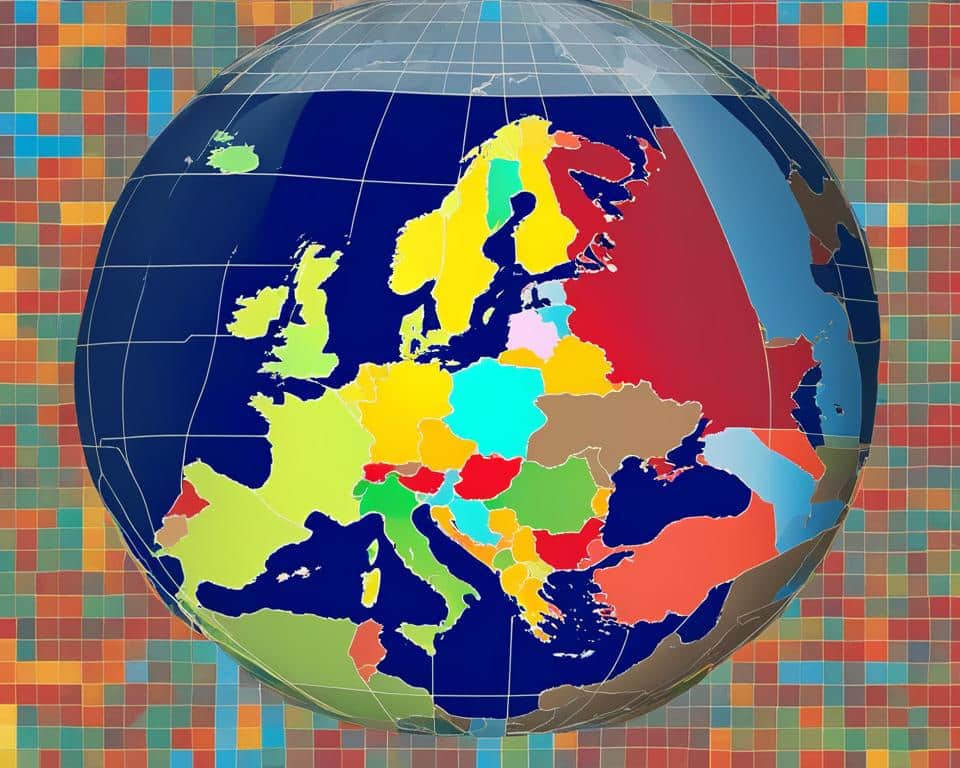Table of contents
- Business Stats in Italy
- Business Stats in Germany
- Business Stats in France
- Business Stats in Spain
- Business Stats in Portugal
- Business Stats in Belgium
- Business Stats in Austria
- Business Stats in Poland
- Business Stats in Sweden, Norway, and the Netherlands
- Business Stats in the United Kingdom
- European Business Trends and Insights
- Conclusion
In today’s rapidly evolving global economy, understanding the latest business statistics is crucial for companies and entrepreneurs seeking success in the European market. This article will provide you with an overview of the most up-to-date European business stats that cover various sectors in countries such as Italy, Germany, France, Spain, Portugal, Belgium, Austria, Poland, Sweden, Norway, Netherlands, and the United Kingdom.
From analyzing the economic performance of these nations to highlighting key trends and growth areas, we aim to equip you with valuable insights that can inform decision-making and strategic planning.
So, let’s dive into the facts and figures that shape the business landscape in Europe!
Key Takeaways
- The article offers an overview of the latest European business statistics.
- Insights into economic performance and trends in key countries.
- Provides valuable information for decision-making and strategic planning.
- Focused on various sectors across Europe.
- Highlights growth areas and key indicators.
Business Stats in Italy
In this section, we will explore the latest Italian Business Stats and delve into the Italy Economic Performance. Italy, known for its rich cultural heritage and exquisite cuisine, also boasts a vibrant business landscape that plays a significant role in the European economy.
Key Trends and Data Points
Italy’s business sector has witnessed several key trends and noteworthy data points in recent years. Let’s take a closer look at some of the highlights:
- The manufacturing industry remains a vital contributor to Italy’s economy, with sectors such as automotive, machinery, and fashion enjoying robust growth.
- The service sector has also experienced steady expansion, particularly in areas such as tourism, finance, and information technology.
- Small and medium-sized enterprises (SMEs) form the backbone of Italy’s business landscape, accounting for a significant portion of employment and economic activity.
Despite these positive indicators, Italy has faced certain challenges in its economic performance. The country has been grappling with a high level of public debt and slow productivity growth, which have impacted its overall economic stability and growth potential.
Italy’s business sector, characterized by diverse industries and a thriving SME ecosystem, plays a vital role in driving economic growth and creating employment opportunities. However, addressing the challenges of public debt and low productivity is crucial for unleashing Italy’s full potential and ensuring sustainable prosperity.
Read more about business statistics and culture in Italy
Business Stats in Germany
In this section, we will delve into the business statistics and economic performance of Germany, providing insights into the country’s business landscape.
Germany, known for its strong and innovative economy, plays a significant role in the European business landscape. Let’s take a closer look at some key statistics and trends that highlight Germany’s economic performance.
Key Economic Indicators
Germany boasts one of the largest economies in Europe and is renowned for its manufacturing sector, which includes the production of high-quality automobiles, machinery, and chemicals. Here are some key economic indicators that showcase Germany’s business landscape:
The German Business Landscape
Germany’s business landscape reflects its position as a global economic leader. The country is home to numerous influential companies across various sectors, from automotive giants like Volkswagen and BMW to technology powerhouses such as SAP and Siemens.
Here is a breakdown of some key sectors that contribute to Germany’s economic performance:
Germany’s strong manufacturing sector fuels its export-oriented economy, while the services sector plays a crucial role in providing diverse business opportunities and generating employment.
Read more about business statistics and culture in Germany
Business Stats in France
In this section, we will delve into the business statistics and economic performance of France, providing an overview of key figures and trends. French Business Stats offer valuable insights into the country’s economic landscape and provide a comprehensive understanding of its business sector.
Business Sectors in France
France boasts a diverse range of thriving business sectors. Here are some key sectors that contribute significantly to the country’s economic performance:
- Automotive Industry: France is known for its prestigious automobile manufacturers, including Renault and Peugeot. The automotive industry plays a vital role in the country’s economy, generating employment opportunities and driving innovation.
- Technology and Innovation: France has a robust technology and innovation sector, with companies such as Ubisoft, Dassault Systèmes, and Thales leading the way. The country actively promotes research and development, fostering a thriving startup ecosystem.
- Tourism: France is renowned for its cultural heritage, attracting millions of tourists each year. The tourism sector contributes significantly to the country’s economy, supporting hotels, restaurants, museums, and other related industries.
Investment Opportunities
France offers numerous investment opportunities across various sectors. The government has implemented measures to attract foreign direct investment, providing incentives and support for businesses looking to establish a presence in the country.
Whether it’s expanding into the French market or collaborating with local companies, investing in France can offer access to a highly skilled workforce, advanced infrastructure, and a strategic location within the European Union.
| Key Industries | Investment Opportunities |
|---|---|
| Renewable Energy | France aims to increase its share of renewable energy sources and offers opportunities in wind energy, solar power, and hydropower. |
| Healthcare | The French healthcare sector is highly regarded, providing opportunities in medical research, pharmaceuticals, and digital health. |
| Aerospace and Aviation | France has a flourishing aerospace industry, offering investment prospects in aircraft manufacturing, space exploration, and satellite technology. |
As depicted in the image, the French Business Stats demonstrate France’s economic growth and industrial diversity. Investing in France can unlock opportunities in various sectors and contribute to long-term business success France
Read more about business statistics and culture in France
Business Stats in Spain
Spain, a vibrant and diverse country in Southern Europe, boasts a strong business landscape and a resilient economy. With a rich cultural heritage, breathtaking landscapes, and a favorable business climate, Spain has positioned itself as a prominent player in the global market.
When it comes to Spanish Business Stats, the country has witnessed impressive economic performance in recent years. From thriving industries to steady growth, Spain continues to attract both domestic and international investors.
Growth Trends in Key Sectors
Spain’s business landscape showcases a range of key sectors that contribute to its economic prosperity. The following sectors have experienced significant growth and play a crucial role in Spain’s overall performance:
- Tourism: Spain is known globally for its tourism industry, attracting millions of visitors each year. The country’s diverse landscapes, vibrant culture, and historical sites make it a popular destination for travelers.
- Renewable Energy: Spain has made significant strides in the renewable energy sector, particularly in wind and solar power. The country’s commitment to clean energy sources has resulted in increased investment and job creation.
- Technology: Spain has a growing technology sector, with Barcelona and Madrid emerging as major innovation hubs. The country encourages entrepreneurship and fosters a supportive ecosystem for startups.
- Automotive: Spain is a leading player in the automotive industry, with renowned brands such as SEAT and Renault manufacturing their vehicles in the country. The automotive sector contributes significantly to Spain’s GDP.
Spanish Economic Performance
In terms of Spain’s economic performance, the country has displayed resilience and adaptability in the face of challenges. The following factors contribute to Spain’s robust economy:
- Steady GDP Growth: Spain’s economy has experienced steady growth in recent years. The country continues to attract foreign direct investment, further fueling its economic expansion.
- Job Creation: Spain has made significant progress in reducing unemployment rates and creating new job opportunities. The government’s focus on fostering entrepreneurship and innovation has contributed to job growth.
- Export-oriented Economy: Spain has established itself as an export-oriented economy, with a diverse range of products and services. The country’s strategic location and strong trade relations contribute to its export success.
As can be seen, Spain’s economic performance is impressive, and the country continues to create opportunities for investors, businesses, and individuals alike.
Read more about business statistics and culture in Spain
Business Stats in Portugal
In this section, we will analyze the Portuguese Business Stats and delve into the Portugal Economic Performance. Portugal, located in Southern Europe, is known for its rich culture, historical landmarks, and a growing business sector that contributes to the country’s economic growth.
Portugal’s business landscape is diverse, with significant contributions from various industries such as tourism, manufacturing, services, and technology. These sectors have played a vital role in shaping the country’s economic performance and attracting foreign investment.
To gain a better understanding of Portugal’s business stats, let’s take a closer look at some key indicators:
- Gross Domestic Product (GDP): Portugal’s GDP has shown steady growth over the years, reflecting a resilient economy. The country has successfully navigated challenges and implemented strategic initiatives to support economic development.
- Unemployment Rate: Portugal has made significant progress in reducing its unemployment rate. The government’s efforts to enhance labor market flexibility and promote entrepreneurship have positively impacted employment opportunities in the country.
- Foreign Direct Investment (FDI): Portugal has attracted substantial foreign direct investment, particularly in key sectors such as renewable energy, technology, and tourism. This influx of investment has contributed to job creation and economic diversification.
- Exports and Imports: Portugal has a well-developed export-oriented economy, with a focus on sectors such as textiles, automobiles, cork products, and wines. The country’s exports contribute significantly to its trade balance and overall economic growth.
“Portugal’s business sector demonstrates resilience and innovation. The diverse industries contribute to economic growth and provide ample opportunities for both domestic and international investors.”
Portugal’s business stats and economic performance reflect the country’s ongoing commitment to sustainable growth and adaptability in an ever-changing global market. With a favorable business environment and a skilled workforce, Portugal continues to position itself as an attractive destination for investment and business expansion.
Read more about business statistics and culture in Portugal
Business Stats in Belgium
Exploring the business statistics and economic performance of Belgium, this section will provide an overview of key indicators and trends.
Belgium, located in Western Europe, is renowned for its strong and diversified economy. With a strategic location and a highly educated workforce, the country has positioned itself as a hub for international trade and investment. Let’s examine some of the important business stats and economic performance indicators that reflect Belgium’s economic landscape.
Economic Growth
Belgium’s economy has shown steady growth over the years, with a focus on sectors such as manufacturing, services, and technology. The country has maintained a strong GDP, and its economic performance continues to attract investors from around the world.
Industry and Innovation
Belgium is known for its thriving industrial sector, with a strong focus on sectors like chemicals, pharmaceuticals, automotive, and food processing. The country fosters a culture of innovation and supports research and development, leading to the establishment of cutting-edge industries and attracting global players.
International Trade
Belgium is a highly open economy, with extensive international trade ties. Its strategic location at the heart of Europe, coupled with well-developed transportation and logistics infrastructure, enables easy access to global markets. The country’s exports consist of a wide range of goods, including machinery, chemicals, vehicles, and pharmaceutical products.
Foreign Direct Investment
Belgium is an attractive destination for foreign direct investment (FDI). The country offers a stable business environment, a highly skilled workforce, and favorable investment incentives. This has resulted in the establishment of numerous multinational companies’ regional headquarters in Belgium, contributing to the growth of its economy.
Employment and Labor Market
Belgium maintains a low unemployment rate, with a well-functioning labor market. The country’s workforce is highly skilled and educated, ensuring a competitive edge in various industries. The government focuses on policies that promote job creation and workforce development, leading to a sustainable labor market.
“Belgium’s business statistics highlight its vibrant economy and favorable business environment. The country’s strategic location, skilled workforce, and commitment to innovation make it an attractive destination for entrepreneurs and investors.”
Overall, Belgium’s business statistics and economic performance showcase its strength as a global business hub. The country’s focus on innovation, international trade, and a skilled workforce positions it as an ideal destination for businesses seeking growth and opportunities in Europe.
Read more about business statistics and culture in Belgium
Business Stats in Austria
When it comes to Austrian business stats and economic performance, the country has consistently showcased resilience and growth. Let’s delve deeper into the relevant data points and growth patterns that define Austria’s business landscape.
The Austrian Business Landscape
Austria boasts a diverse and thriving business landscape, with key sectors contributing significantly to its economic performance. Some of the prominent industries include manufacturing, tourism, finance, and technology. These sectors have played a crucial role in driving job creation and foreign investments in the country.
Austria’s strong GDP, coupled with a relatively low unemployment rate, reflects the country’s economic stability and positive business environment. The export sector plays an integral role in Austria’s economy, contributing significantly to its growth. Additionally, the country’s favorable inflation rate and substantial FDI inflows further underscore Austria’s attractiveness to international investors.
Growth Patterns and Opportunities
Austria’s commitment to innovation and research has fueled the growth of key sectors, particularly in technology and advanced manufacturing. The country’s emphasis on sustainability and renewable energy has positioned it as a leader in the green economy. Furthermore, Austria’s strategic location at the heart of Europe provides ample opportunities for businesses to access regional markets and benefit from cross-border collaborations.
Looking ahead, Austria continues to focus on fostering an environment conducive to business growth. With supportive policies, skilled labor force, and a commitment to sustainability, the country is well-positioned to capitalize on emerging trends and drive further economic success.
Read more about business statistics and culture in Austria
Business Stats in Poland
In this section, we will delve into the business statistics and economic performance of Poland. As one of the fastest-growing economies in Europe, Poland has emerged as a key player in the region’s business landscape.
Poland’s economic performance has been commendable in recent years, with steady GDP growth rates and a declining unemployment rate. The country’s strategic location, skilled workforce, and favorable business policies have attracted significant foreign investments, contributing to its economic development.
Key Growth Areas:
- Information Technology and Innovation
- Manufacturing and Export
- Tourism and Hospitality
- Renewable Energy
Poland has witnessed a surge in its IT sector, fuelled by the growth of startups and tech companies. With a focus on innovation and the adoption of new technologies, Poland has established itself as a hub for software development, cybersecurity, and e-commerce.
The manufacturing sector plays a crucial role in Poland’s economy, with industries such as automotive, electronics, and machinery driving export growth. The country’s competitive labor costs and strong manufacturing capabilities have attracted global companies to set up production facilities in Poland.
Tourism and hospitality have also experienced significant growth, with Poland’s rich cultural heritage and picturesque landscapes attracting a growing number of international visitors. The government’s initiatives to promote tourism and improve infrastructure have further boosted this sector.
Furthermore, Poland has been actively investing in renewable energy sources to reduce its dependence on fossil fuels. The country’s wind, solar, and biomass energy sectors have seen substantial development, contributing to a greener and more sustainable future.
In conclusion, Poland has demonstrated impressive business statistics and economic performance, positioning itself as a thriving economy in Europe. The country’s strategic sectors and commitment to innovation make it an attractive destination for both domestic and international investors.
Read more about business statistics and culture in Poland
Business Stats in Sweden, Norway, and the Netherlands
Providing an overview of the business statistics and economic performance in Sweden, Norway, and the Netherlands, this section will highlight trends and growth patterns in these countries.
Sweden, Norway, and the Netherlands are prominent players in the European business landscape. Let’s take a closer look at the key statistics and economic performance indicators for each of these countries:
Sweden Business Stats
Sweden has a thriving business ecosystem, characterized by innovation and sustainability. With a strong emphasis on technology and research, Swedish businesses have made significant contributions to various sectors, including manufacturing, telecommunications, and pharmaceuticals.
Norway Business Stats
Norway, known for its rich natural resources and high living standards, has a robust business environment. The country’s key sectors include oil and gas, renewable energy, maritime industries, and seafood.
Read more about business statistics and culture in the Nordic Countries
Netherlands Business Stats
The Netherlands boasts a highly developed and diverse business sector. Renowned for its international trade, the country excels in industries such as agriculture, logistics, finance, and technology.
These statistics provide valuable insights into the business landscapes of Sweden, Norway, and the Netherlands. Each country has its unique strengths and contributes significantly to Europe’s overall economic performance.
Read more about business statistics and culture in the Netherlands
Business Stats in the United Kingdom
This section delves into the business statistics and economic performance of the United Kingdom, offering valuable insights into key sectors and economic indicators.
Key Economic Indicators
Before exploring the sector-specific data, let’s first take a look at some key economic indicators that provide an overview of the United Kingdom’s economic performance:
- Gross Domestic Product (GDP) Growth Rate – The UK’s GDP growth rate measures the change in economic output over a specific period. It is a crucial indicator of the country’s overall economic performance.
- Unemployment Rate – The unemployment rate reflects the percentage of the labor force that is currently unemployed. It is a vital indicator to understand the health of the job market and the economy as a whole.
- Inflation Rate – The inflation rate measures the average percentage increase in consumer prices over time. It is an essential indicator to assess the purchasing power of consumers and the stability of prices.
Now, let’s dive deeper into the sector-specific business statistics to gain a comprehensive understanding of the United Kingdom’s economic landscape.
Key Sectors in the United Kingdom
The United Kingdom is known for its diverse economy, with various sectors contributing to its economic growth and development. The following sectors play a significant role:
- Financial Services – The UK’s financial services sector is one of the largest in the world, encompassing banking, insurance, asset management, and fintech.
- Manufacturing – Manufacturing is another vital sector in the United Kingdom, with industries ranging from automotive and aerospace to pharmaceuticals and food processing.
- Technology and Innovation – The UK has a thriving technology and innovation sector, with London often referred to as a global tech hub.
- Energy – The energy sector in the UK includes renewable energy, oil and gas, and nuclear power, contributing to the country’s energy independence and sustainability goals.
- Retail and Consumer Goods – The retail and consumer goods sector plays a significant role in the UK’s economy, with both domestic and international consumer demand driving growth.
- Tourism and Hospitality – The United Kingdom is a popular tourist destination, attracting millions of visitors each year and contributing to the country’s economy through hospitality, travel, and leisure activities.
“The United Kingdom’s business landscape showcases a diverse range of sectors, each contributing to the country’s economic performance. From financial services and manufacturing to technology and innovation, the UK offers a conducive environment for businesses to thrive. By analyzing key economic indicators and sector-specific statistics, we gain valuable insights into the United Kingdom’s economy.”
Read more about business statistics and culture in the United Kingdom
European Business Trends and Insights
As we delve into the business statistics of Italy, Germany, France, Spain, Portugal, Belgium, Austria, Poland, Sweden, Norway, the Netherlands, and the United Kingdom, we gain valuable insights into European business trends and the continent’s overall economic performance. Analyzing key sectors and growth patterns, let’s explore some of the noteworthy findings:
1. Growth in the Technology Sector
The technology sector continues to thrive across Europe, with countries like Germany and the Netherlands emerging as leading hubs for innovation and technological advancements. Investments in research and development, coupled with supportive government policies, have contributed to the rapid growth of this sector, driving economic performance in many European nations.
2. Sustainable Business Practices
European businesses have embraced sustainability, with a strong emphasis on environmentally friendly practices and corporate social responsibility. Companies are increasingly incorporating sustainability into their operations, leading to improved long-term performance, reduced environmental impact, and enhanced brand reputation.
3. E-commerce Boom
The COVID-19 pandemic has accelerated the growth of e-commerce throughout Europe. Consumers have increasingly turned to online shopping, leading to a surge in demand for digital services, logistics, and fulfillment industries. Countries like Spain and Italy have witnessed significant growth in the e-commerce sector, presenting new opportunities for businesses.
4. Shift Towards Remote Work
The pandemic has also catalyzed a shift towards remote work, with many companies adopting flexible work arrangements. Countries such as Sweden and Norway have successfully implemented remote work policies, enabling businesses to thrive while maintaining a healthier work-life balance for employees.
“The ongoing digital transformation, sustainability focus, and adaptability to remote work are key drivers behind European business trends and economic performance,” says Robert Davis, an industry expert.
These trends indicate a promising future for European businesses, with opportunities for growth and innovation across various sectors. By capitalizing on emerging technologies, prioritizing sustainability, and embracing flexible work models, businesses can navigate the changing landscape and drive economic prosperity.
| Country | Key Business Trend |
|---|---|
| Germany | Rapid growth in the technology sector |
| Spain | Significant rise in e-commerce |
| Netherlands | Leading in innovation and sustainability |
| Sweden | Successful implementation of remote work policies |
Overall, European business trends reflect a dynamic and evolving landscape. By embracing these trends, businesses can position themselves for success and contribute to Europe’s continued economic growth.
Conclusion
In conclusion, this article has provided a comprehensive overview of European business statistics, examining key countries and sectors. By analyzing the latest data and offering valuable insights, we aim to enhance your understanding of the European business landscape.
We have explored the economic performance of countries like Italy, Germany, France, Spain, Portugal, Belgium, Austria, Poland, Sweden, Norway, the Netherlands, and the United Kingdom. Through these analyses, we have identified emerging trends and growth patterns that shape each country’s business sector.
By examining European business trends and insights, our goal is to equip you with the knowledge necessary to make informed decisions and uncover untapped opportunities. Whether you are an entrepreneur, a business professional, or an investor, understanding the strengths and challenges of these markets will enable you to navigate the complexities of the European business ecosystem more effectively.











